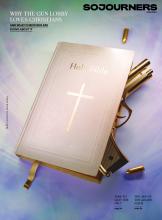Share As A Gift
Share a paywall-free link to this article.
This feature is only available for subscribers.
Start your subscription for as low as $4.95. Already a subscriber?

Illustration by Danielle Del Plato.
THE LEADING CAUSE of death for children in 2020 wasn’t COVID-19. It wasn’t cancer. And it wasn’t car crashes. Rather, more than 4,300 of our children in the United States died by firearms — the first time in at least 40 years that guns have accounted for more deaths than motor vehicle incidents.
The numbers are stark: More than 110 people in the U.S. are killed every day with guns, while more than 200 others are shot and wounded. “Gun violence in any form — any form — leaves a mark on the lives of those who are personally impacted,” Giselle Morch, a deacon and mother whose son, Jaycee, was shot and killed in their home, told Sojourners. “So many of us will never be the same.”
On July 19, 2017, Morch took her grandson to Vacation Bible School, where she played the role of the Lord in a skit from Judges about Gideon and the Midianites. “One of the lines was ‘For God and for Gideon,’” Morch said. “And when I got home, that’s when the battle was: That’s when my own son was murdered — my son who said, ‘I may not change the world, but I want to inspire many.’”
One thing about the senseless loss of Jaycee has always been clear to Morch: “This could have been prevented.” Shortly after he was killed, Morch began volunteering with Moms Demand Action for Gun Sense in America to advocate for cultural and legislative change. She has since joined Everytown for Gun Safety’s Survivor Fellowship Program to connect with others who have been impacted by gun violence. “There are others in this movement, because it’s not a moment,” Morch said. “A moment was when my son died; a movement is the call to action to make the change so that nobody else does.”

Got something to say about what you're reading? We value your feedback!